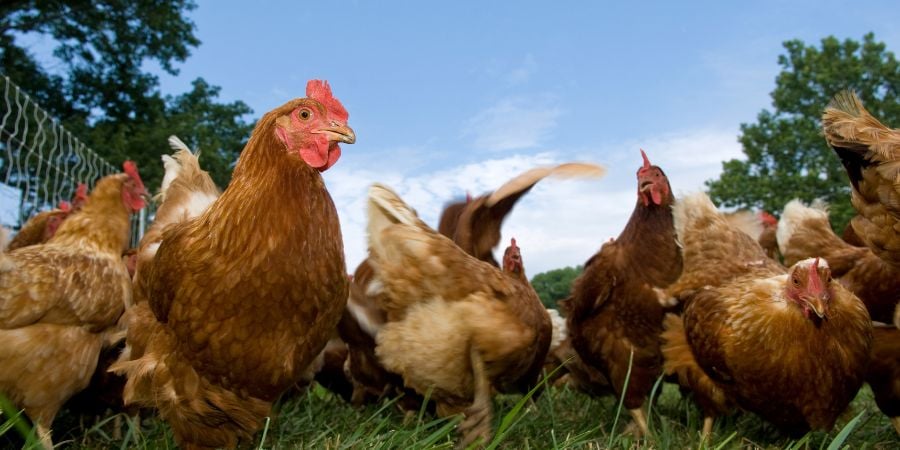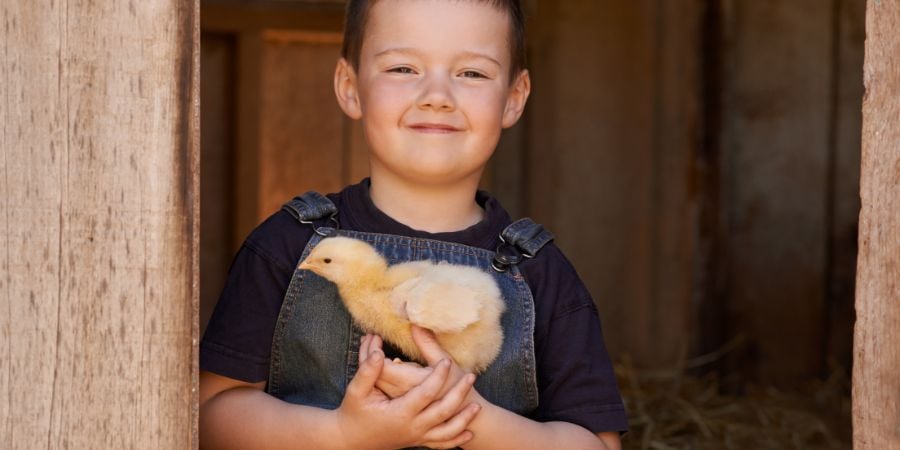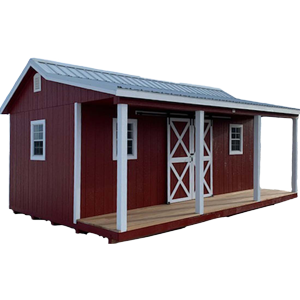Eggs, Education, and Enjoyment: The Joy of Raising Backyard Chickens
by Dakota Storage Buildings, on February 14, 2024

While it is true that the eggs you will collect when raising backyard chickens are delicious, boasting a richer flavor and a more vibrant yolk than their store-bought eggs, there is so much more to this endeavor. Chickens are not only a source of fresh eggs but also bring a multitude of benefits to your home and garden. One of the most notable advantages of having chickens in your backyard is their role in natural pest control. These birds are experts at foraging for bugs and insects, keeping your garden free from unwanted pests in the most organic way possible.
In addition to the tangible benefits, there is an intangible charm to raising chickens. Watching them roam around your backyard, pecking at the ground, and interacting with each other offers a soothing connection to nature and a break from the hustle and bustle of modern life. Raising backyard chickens is an adventure that extends well beyond the simple joy of collecting eggs. It is about embracing a more sustainable lifestyle, enjoying the health benefits of fresh, nutritious eggs, contributing positively to your garden's ecosystem, and experiencing the simple pleasures of connecting with these birds. The superiority of local, free-range eggs over industrial ones is just the beginning of this fulfilling experience.
What to Know Before Raising Backyard Chickens
Before you set out on your exciting chicken-raising adventure, it is essential to first navigate the legal landscape of keeping backyard chickens. This initial step is critical, as local regulations regarding backyard chickens can be surprisingly diverse and specific. These regulations may dictate various aspects of chicken keeping, ranging from the total number of chickens you are allowed to keep, whether roosters are permitted, to certain requirements about coop placement and size. In some areas, there might be outright bans or strict limitations, while others might be more lenient.
Once you have a clear understanding of your local regulations and have ensured you comply, the next step is to consider the specific environmental conditions of your area. This includes assessing the climate and weather patterns. Different breeds of chickens have varying levels of tolerance to temperature extremes, so it is crucial to choose a breed that will thrive in your local climate. For instance, if you live in a region with high temperatures, selecting heat-tolerant breeds is essential, as some chickens do not fare well in extreme heat. However, if you are in a cooler climate, breeds that can withstand lower temperatures and are more cold-hardy would be a better choice.
When planning where to set up your coop and run, you should consider the importance of natural light. Chickens are naturally driven by light, which plays a significant role in their laying cycles. Positioning your coop in a sunny spot is beneficial for maximizing egg production. However, it is also important to provide areas of shade to protect your chickens from overheating and to give them a comfortable environment. Also, think about the overall placement and security of the coop. It should be situated in a place that is safe from predators and extreme weather conditions. Good drainage is also key to keeping the coop dry and healthy. The coop should have easy access for cleaning and egg collection without compromising the safety and comfort of your chickens.
Getting a Coop That Meets Their Every Need
Creating the ideal home for your backyard chickens begins with constructing a robust and waterproof coop floor. This aspect cannot be overstated, as a solid floor prevents moisture from seeping in, which is crucial for preventing the decay and deterioration of the coop structure. Moisture can lead to a host of problems, including mold growth and the accumulation of bacteria, which are harmful to the health of your chickens. Waterproof floors make cleaning easier and more effective, ensuring that the living environment remains hygienic and conducive to the chickens’ health.
Equally important is the choice of roofing materials for your coop. The roof plays a pivotal role in regulating the internal temperature of the coop, providing much-needed insulation during colder months and preventing overheating in the summer. Materials that reflect sunlight can help keep the coop cooler in hot weather while insulating materials retain warmth when it is cold. A well-thought-out roof design, with elements like vents or opening panels, can further enhance temperature control, contributing to the overall comfort and well-being of your flock. Proper airflow helps to remove moisture, ammonia, and other harmful gases, maintaining a healthy environment inside the coop. Good ventilation also reduces the risk of respiratory diseases, which are common in poorly ventilated spaces.
Considering the social nature of chickens, it's recommended to start with a flock of at least six birds. Chickens are communal animals and thrive in the company of their kind. This social interaction is crucial for their mental well-being and can even impact their physical health. A lonely chicken is often a stressed and unhealthy chicken. When it comes to space, adequate room is vital for the health and happiness of your chickens. In an enclosed run, aim to provide at least 8-10 square feet of space per bird. This space allows them to move freely, stretch their wings, and engage in natural behaviors like foraging, dust bathing, and pecking. Inside the coop, each chicken should have enough space to roost comfortably. Additionally, include one nesting box for every four hens to ensure that they have a quiet, comfortable place to lay their eggs.
When choosing a coop, prioritize safety and functionality. A coop must be secure from predators and strong enough to withstand local weather conditions. Stationary coops are robust and offer enhanced protection against predators. Choosing a coop should depend on your specific needs, backyard size, and the lifestyle you wish to provide for your chickens. A well-planned coop, considering all these factors, will not only make your life easier but also ensure a healthy, happy, and productive flock.
A Hen's Egg-laying Journey

Hens typically begin laying eggs when they reach the age of 18 to 22 weeks, a milestone that's often marked by the development of adult feathering. This feathering is not just a physical transformation but also a sign that they are ready to start the egg-laying process. Early egg production can be somewhat irregular and unpredictable. New layers may not lay eggs daily; the frequency and consistency of their laying will gradually increase as they grow older and their reproductive systems fully mature. Once hens reach a certain age, they enter a phase commonly referred to as 'retirement,' where their egg-laying frequency diminishes or stops altogether. However, these retired hens can still play a valuable role in your backyard ecosystem. They are excellent at foraging for insects and pests, providing natural pest control in your garden. Additionally, their manure is a fantastic source of nitrogen-rich fertilizer.
The egg-laying patterns of hens are significantly influenced by seasonal changes and the duration of daylight they receive. As the days shorten in autumn and winter, you may notice a decrease in egg production. This is because chickens are highly responsive to light, which plays a critical role in regulating their reproductive cycle. To counteract this natural reduction in daylight hours, and to maintain a steady supply of eggs, many chicken owners resort to using artificial lighting in the coop. This supplemental light mimics the longer days of spring and summer, encouraging hens to continue laying throughout the winter months.
Collecting eggs is a daily ritual that should ideally be done early in the morning. This practice ensures that eggs are collected soon after they are laid, minimizing the chances of them getting dirty, damaged, or eaten by the chickens. It is crucial to inspect each egg for cracks or breaks. Eggs with cracked shells should be discarded immediately, as they are susceptible to bacterial contamination. Bacteria can penetrate through these cracks, spoiling the egg and potentially posing a health risk.
Unveiling the Joys of Raising Backyard Chickens

Embarking on the journey of raising chickens brings a multitude of unexpected joys and gratifying experiences that extend far beyond the practical benefits of fresh eggs and natural pest control. This section delves into the heartwarming and often amusing world of chicken raising, highlighting the unique pleasures and enriching experiences that come with caring for these feathered companions.
Collecting Farm-fresh Eggs
There is a unique sense of pride and joy in collecting farm-fresh eggs from your backyard. The experience surpasses simply having a convenient source of eggs. They are not only fresher but often more flavorful and nutritious than those bought from a store, having come from chickens that you know have been well-fed and cared for. Once you have tasted these organic, pasture-raised eggs, it is hard to return to the ones available in supermarkets. This daily ritual of collecting eggs becomes a cherished part of your routine, offering a tangible reward for your dedication to chicken raising.
Observing Flock Dynamics
Chickens are fascinating creatures with complex social behaviors. Watching the dynamics within your flock is both entertaining and educational. Contrary to what some might think, chickens have a distinct hierarchy known as the “pecking order.” Observing how each chicken finds its place in this social structure, how they interact with one another, and how they communicate can be captivating.
Mother Hen and Chicks
Witnessing the nurturing behavior of a mother hen with her chicks is one of the simple joys of raising chickens. If you have ever had the opportunity to allow a broody hen to incubate and hatch her eggs, you will know it is a special experience. Watching the mother hen teach her chicks to feed, forage, and navigate their world is a delightful aspect of chicken raising. It offers a firsthand look at the instinctual behaviors of birds and the strong bond between mother and chicks, adding a heartwarming element to the overall experience.
What a Flock Brings to Your Property
Allowing chickens to free-range can transform the ambiance of your property. There is something inherently peaceful and grounding about watching them roam, peck, and forage across the yard. They bring life and movement to the landscape, often becoming a talking point for visitors and a source of interest for children. In addition to their visual appeal, chickens contribute to the ecosystem of your yard, helping with pest control and providing natural fertilization for the soil.
Watch Each Chickens Personality Grow
The comedic aspect of chickens is often underestimated. Each chicken has its unique personality, quirks, and ways of interacting with the world, which can be incredibly amusing. The flock might engage in unexpected antics, chase each other around, or find creative ways to get to a food source. These moments of humor add a light-hearted and joyful dimension to chicken raising, turning everyday observations into sources of laughter and delight.
Unlock the Rewards of Raising Backyard Chickens
Raising chickens is a venture that demands dedication and commitment, but the multitude of rewards that come with it are truly gratifying. It is not just about the tangible benefits, like the supply of fresh, nutritious eggs and the natural fertilization they provide for your garden. There's also an immeasurable sense of accomplishment and joy that comes from caring for these animals and watching them thrive under your care. Chickens offer a unique form of companionship; their individual personalities, social interactions, and amusing antics can be a constant source of entertainment and delight. However, the success of your chicken-raising endeavor hinges on several critical factors. A well-chosen coop, tailored to meet the specific needs of your flock, is paramount.
For those raising backyard chickens for the first time, the process can seem daunting. We created a comprehensive guide that covers all the essentials of chicken raising. This guide offers insights into everything from selecting the right breed and setting up your coop to understanding chicken behavior and managing their health. By downloading our guide, you'll equip yourself with the necessary tools and information to embark on this fulfilling journey. With the right preparation, a well-designed coop, and a commitment to proper care, you'll discover that the world of backyard chicken raising is not only fulfilling but also fun and enriching. Download our free guide now, and step into the rewarding world of chicken raising!

























